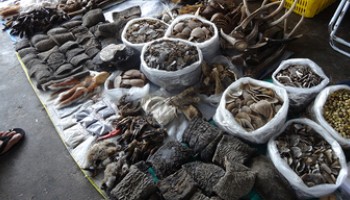In less than 6 months, from December 2018 to April 2019, nearly 3,500 animals, almost all birds, were posted for sale in the southeast Asian country, according to Traffic, an NGO which focuses on wildlife trafficking networks and released a new report last week.
The animals, valued at more than US$600,000, were posted across 44 separate Facebook groups devoted to the illegal wildlife trade.
According to the report, most of those sold were non-native species representing links to cross-border trafficking. Those included parrots, finches and the Red-Whiskered Bulbul which made up around a third of all birds sold.
“The illegal and unsustainable international wildlife trade is one of the main drivers of species extinction, prominently in biodiversity hotspots like Southeast Asia,” Traffic said. “The unregulated bird trade not only depletes wild populations but also poses risks of establishing invasive species and avian disease transmission.”
Birds are the most popular pets in the country.
“In Singapore, the legal pet trade is limited mostly to birds,” Traffic explained, “with only a small number of reptilian and mammalian species allowed for sale under national legislation.”
Only traders are required to obtain licenses to buy and sell birds. Once an illegally acquired bird is transferred to a buyer, there is little recourse for authorities to track it back to its source.
That’s why Traffic is calling on legislators to impose documentation requirements not just on traders but also owners of wildlife.
“Implementing a system that requires owners to register wildlife pets will increase owner accountability and allow tracking of the bird trade from both the seller and consumer end of the trade chain,” said Serene Chng, a Traffic program officer who co-authored the report.
Facebook policy does outlaw the trade of wildlife and many other illegal goods on its pages but in the Facebook-based markets -- which operate through closed or secret groups -- regulation is too often expected to be self-imposed unless caught by outside watchdogs. Experts have long called on the social media giant to address its role as a haven for traffickers in everything from wildlife to antiquities and even human remains.
Though the researchers shared the information they found with both Singaporean authorities and Facebook, when they checked in again after two years in April 2021, 36 of the 44 groups were still operating. Though 13 had been shut down, five of them simply reformed under new names. One of the largest groups shut down, which had more than 18,000 members, was back up within a week, according to Traffic.
“The speed at which group administrators re-formed shows how quickly the more serious traders and hobbyists adapt to the new situation to continue their activities,” Traffic said. “A long-term approach to truly disrupt illegal activity would require the active cooperation of social media platforms and law enforcement agencies to take tangible actions against those who persist in trading in closed and secret groups.”






